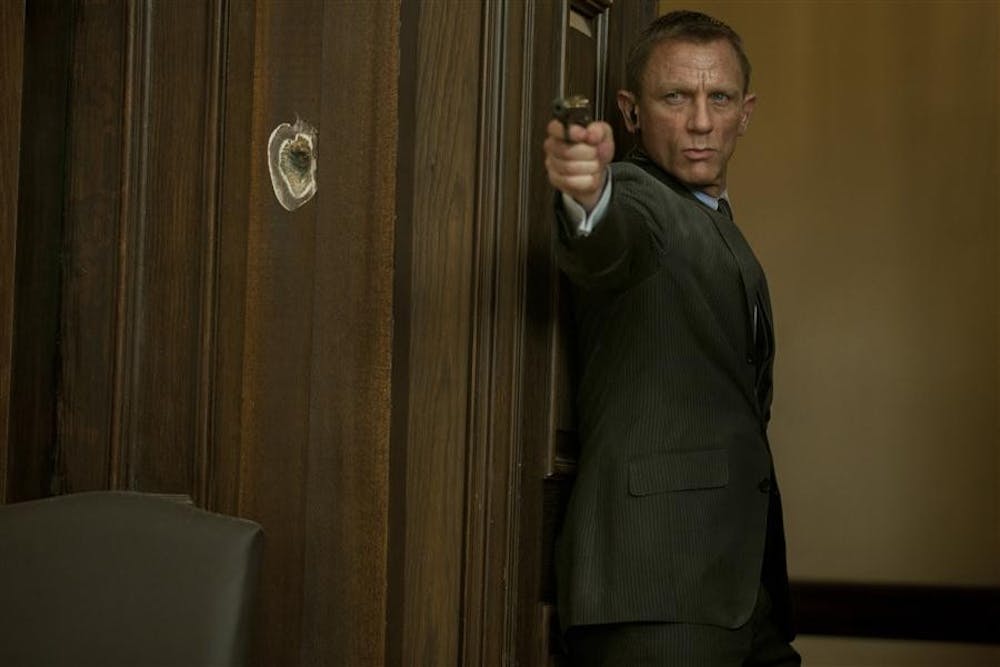Guns, cars, girls and martinis. Why is 007 still so cool?
James Bond is somehow more and less than that hypermasculine formula for box office success. He’s constantly reinvented, but he’s always cool. Or supposed to be.
The $5 billion and 23-film Eon Productions franchise has had its fair share of bland Bonds. 2008’s “Quantum of Solace” featured Daniel Craig as a single-minded 007 ruthlessly pursuing revenge.
“The Bond franchise suffers when he becomes a kind of blunt action hero and an inarticulate one,” said Stephen Watt, IU Department of English chair and co-editor of “Ian Fleming and James Bond: The Cultural Politics of 007.”
The Bond of “Quantum of Solace” did everything Bond should do, but just wasn’t cool. Craig himself criticized that film’s underwritten 007, who lacked the character depth that elevates Bond above other action heroes.
Critics and audiences agree “Skyfall” is a return to form.
Craig’s 007 is back, and once again he feels like a real, smart and soulful Bond. It’s more than the suit and the gadgets that make the character what he is.
Craig strikes at something closer to the Bond of Fleming’s books, replete with physicality and moodiness. The latest Bond even cries.
In Craig’s portrayal, “that vulnerability in that hypermasculinity is still there,” Watt said.
Fleming’s 007 coped with depression and had a deeper emotionality than was represented in most of the classic Bond films. He was still defined by his desirability and the interchangeability of his sexual conquests.
Filmmakers in “Skyfall” have smartly shied away from the clichéd image of every woman in sight throwing herself at Bond, which seems more cartoonishly mysogynist than cool.
Mainstream feminism and understandings of rape culture demand an overhaul of Bond’s detached and magnetic brand of heteromasculinity, once a hallmark of the character.
In “Casino Royale,” Craig’s first appearance, Bond gets as close to true love as he has since “On Her Majesty’s Secret Service.”
His partner, Vespier Lynd (Eva Green) betrays him, and the audience gets an explanation for Bond’s fragmented misogyny. It’s unsophisticated gender politics, but it delves more deeply into Bond’s psyche than most of the movies have been willing to. And Vesper is more than a disposable Bond girl.
“She’s tough, and she’s smart, and she’s quick-witted, and I think it’s really important that that be retained in the script,” Watt said. “Otherwise, the womanizing and the eye candy and the promiscuity become kind of meaningless.”
A formidable female lead can make or break Bond as a compelling character. In “Skyfall,” that lead is a familiar face.
“The ultimate Bond girl is Judi Dench, is M,” Watt said.
M, the head of M16, matches Bond line for line, plays him and holds her cards close to her chest. In “Skyfall,” she is the emotional backbone and motivation of the plot.
Once you add relevant political context to the complicated female lead, “Skyfall” redefines Bond as a real pop cultural player.
Oscar-winner Javier Bardem’s Raoul Silva is an ex-MI6 agent come back to wreak cyberterror on M and M16. He looks like the ghost of government deceit returning to haunt the state — a villain for contemporary Britain. His whiteface and blonde hair are symbolic remnants of the imperial imprint British secret intelligence left on him.
It’s a revealing story of national insecurity about national security, political commentary fit for a post-9/11 modern-colonial West anxious about its uncertain enemies.
Though the movies don’t need cultural commentary to strike gold or tell a good story, the success of Bond seems in large part due to his relevance. Without it, he’s not cool. “Skyfall” makes Bond matter today.
007 is cool again. Again.
Bond. James Bond.

Get stories like this in your inbox
Subscribe





